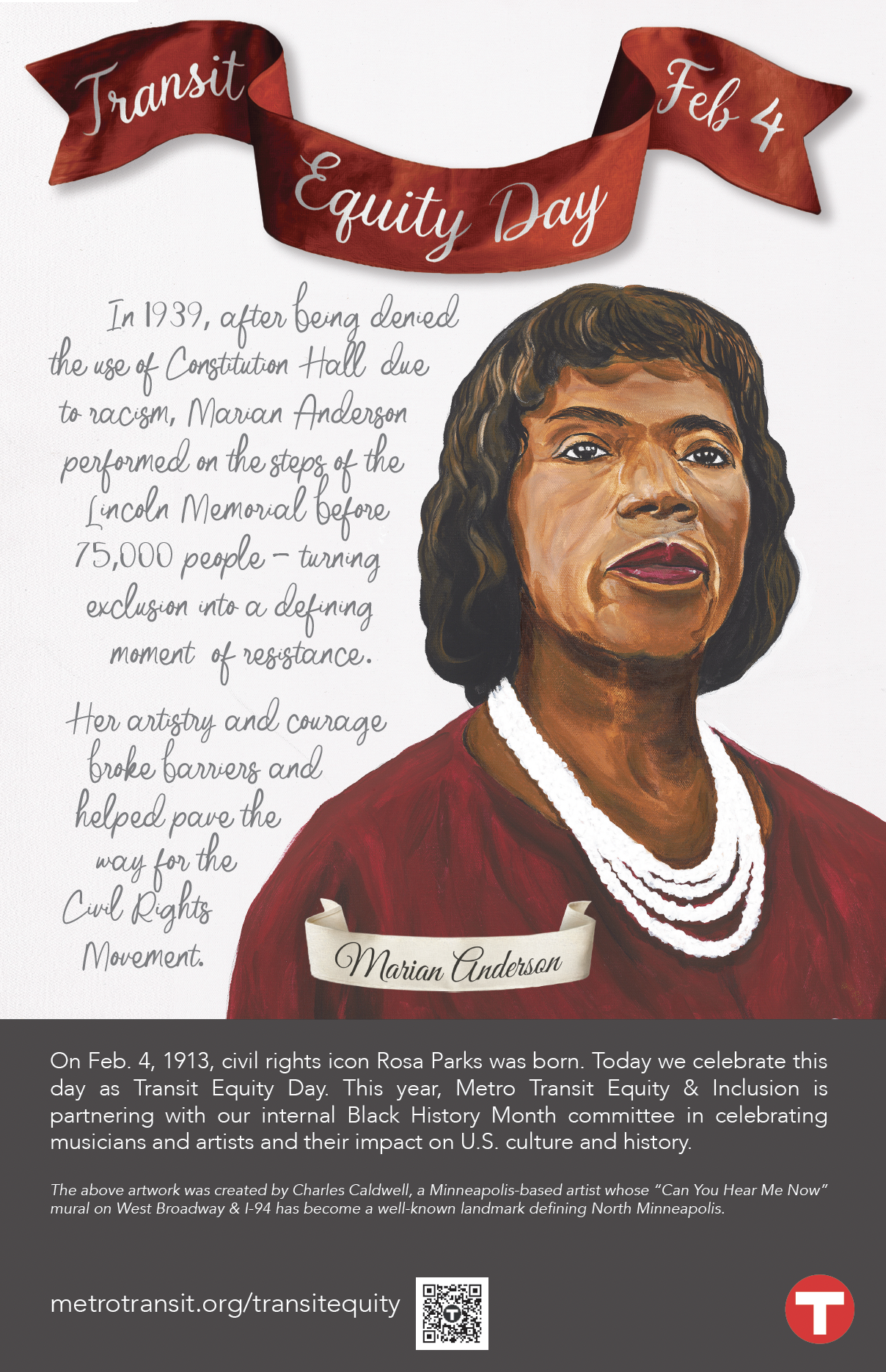TRANSIT EQUITY DAY 2026

Marian Anderson Story:
Caldwell chose to feature Marian Anderson for Metro Transit’s 2026 Transit Equity Day poster to unite the themes of music and equity.
In 1939, Marian Anderson was invited to sing at Howard University as part of its concert series, but because of Anderson’s international fame, the university needed to reserve a larger venue. They tried to commission Constitution Hall but the Daughters of the American Revolution, who owned the hall, had a white-artist-only clause in their contracts and refused to allow her to use the hall because she was Black.
Eleanor Roosevelt, who was a member of the Daughters of the American Revolution organization at the time, was outraged by this decision. She resigned from the organization and wrote about it in her weekly column, “My Day.” This led to the planning of a public concert on the steps of Lincoln Memorial on Easter Sunday, April 9, 1939, where Marian Anderson performed before 75,000 people – turning exclusion into a defining moment of resistance.
Her artistry and courage broke barriers and helped pave the way for the Civil Rights Movement.
Advancing Transit Equity in the Region
During 2025 Metro Transit launched three rapid transit lines (Gold, B, and E lines) enhancing service to those corridors and connecting lines. Metro Transit’s network of fast, frequent, all-day buses and trains provide speed and reliable service that advances equity in our region.
Entering 2026, the METRO system includes two light rail lines -- the Blue Line and Green Line -- and eight bus rapid transit lines. Together, nearly a half-million people and jobs are within a 10-minute walk or roll of a METRO station.
Several other bus rapid transit projects are in the planning stage, including the F Line, G Line, H Line, and an extension of the Gold Line to Minneapolis. Work is underway to identify other future METRO corridors that could be completed before 2035.
Construction is substantially complete on the Green Line Extension to Eden Prairie, which will open in 2027. The Blue Line Extension, continuing light rail service from downtown Minneapolis to Brooklyn Park, also is under development.
A fully built out METRO system would put 717,000 people – nearly a quarter of our region's residents – and 694,000 jobs within a 10-minute walk or roll of a METRO station.
Equity Statement
Metro Transit's adopted Transit Equity statement, drafted by our Equity & Inclusion Team and informed by feedback from employees across the organization, guides the steps we're taking to be more equitable and inclusive. It reads:
Metro Transit acknowledges that providing safe, affordable, and reliable transportation increases opportunity. Transit services and programs should be built to equitably benefit all, especially under-served communities, including BIPOC, low-wealth, women, people with disabilities, LGBTQ, youth and older adults. Transit equity requires identifying and addressing injustices and building actionable pathways to create a fair and more just future.
Metro Transit understands that transit decisions can impact the ability of under-served communities to find and keep jobs, reach medical care, access educational opportunities and affordable housing, and develop and maintain social connections, among other impacts. Transit services and investments can reduce spatial inequalities that contribute to racial, environmental, and economic disparities.
Metro Transit has an essential role and responsibility to examine all decisions impacting our region’s access to quality transit, reduce existing disparities, and prevent further inequities by:
-
Reviewing and revising policies
-
Seeking partnerships with other responsible institutions; and
-
Improving planning and operational practices
Key Definitions
Under-served communities: Local communities that have been historically excluded from transit decision-making and benefits while carrying disproportionate burdens.*
BIPOC: Black, Indigenous and People of Color.
Disability: Includes people with physical, sensory, emotional, and cognitive disabilities, and those with chronic/severe illness. We understand the experience of disability to occur within any and all walks of life, with deeply felt connections to all communities impacted. (adapted from Sins Invalid Organization’s mission)
Inequities: When a group or an area is serviced, represented, and/or invested greater than another group or area based on access, power, and/or privilege.
Spatial inequalities: The unequal amount of resources and services that can be accessed depending on the area or geographical location.
*MnDOT: Advancing Transportation Equity Initiative focuses on communities: (1) Underrepresented in transportation processes; (2) Experiencing known inequities in access or outcomes; (3) With unique transportation needs not well served by a business-as-usual approach
For more information on Metro Transit’s equity initiatives, see metrotransit.org/Equity